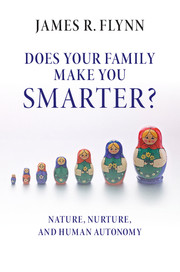Book contents
- Frontmatter
- Dedication
- Epigraph
- Contents
- List of figures, tables and boxes
- Acknowledgments
- Part I Human autonomy
- 1 Twins and autonomy
- 2 Justice and freedom
- 3 The great debate
- 4 Slow and quick decay of family effects
- 5 Reconciliation with twins and adoptions
- 6 The fairness factor
- Part II Intelligence
- For scholars who wish to use the Age-Table Method to measure family effects in nations other than the USA
- Appendix I Wechsler Vocabulary and description of method of analysis
- Appendix II Stanford-Binet Vocabulary
- Appendix III Raven's Progressive Matrices
- References
- Name index
- Subject index
3 - The great debate
from Part I - Human autonomy
Published online by Cambridge University Press: 05 June 2016
- Frontmatter
- Dedication
- Epigraph
- Contents
- List of figures, tables and boxes
- Acknowledgments
- Part I Human autonomy
- 1 Twins and autonomy
- 2 Justice and freedom
- 3 The great debate
- 4 Slow and quick decay of family effects
- 5 Reconciliation with twins and adoptions
- 6 The fairness factor
- Part II Intelligence
- For scholars who wish to use the Age-Table Method to measure family effects in nations other than the USA
- Appendix I Wechsler Vocabulary and description of method of analysis
- Appendix II Stanford-Binet Vocabulary
- Appendix III Raven's Progressive Matrices
- References
- Name index
- Subject index
Summary
Questions
(1) What evidence proves that family effects are still significant at ages 17–18?
(2) How can this data be converted into the number of IQ points that family environment confers as an advantage or disadvantage?
I will settle the great debate about whether family effects are still significant at the age of 17. We now know the practical significance of this question. It may seem trivial whether 3 IQ points hamper or help the typical 17-year-old thanks to his or her family environment, but this determines whether or not young people qualify for the universities to which they aspire and whether justice enters into the equation. Thus far the combination of twin studies and adoption studies have not been decisive. Fortunately, a new source of data decides the question. At least some cognitive abilities really are influenced by family environment at that crucial age.
A pause for reflection
To prepare the mind to appreciate the new method, the following is a useful exercise:
(1) Assume that individual differences on IQ tests and subtests are determined by two factors that are mutually exclusive: differences in genes and differences in systemic environment like family. For the moment we will set aside differences in chance environment (life's boons and ills and the effects of human autonomy) as irrelevant.
(2) We want to compare childhood ages with the age of 50. Assume that by that age, genes and current environment have become perfectly correlated and family background has no independent influence. While at childhood, it does have an impact independent of genes.
(3) Surely it would make sense to compare performance at age 50 (when the two factors are “pulling together”) with age 10 (when they are at odds) to see if we can detect a difference between the two that would allow us to measure the degree to which family environment has an independent impact.
(4) To follow through, it remains to isolate the proper data, to hypothesize how family might affect that data, to look for its footprint, and to find a way of measuring the size of that footprint.
- Type
- Chapter
- Information
- Does your Family Make You Smarter?Nature, Nurture, and Human Autonomy, pp. 30 - 41Publisher: Cambridge University PressPrint publication year: 2016



